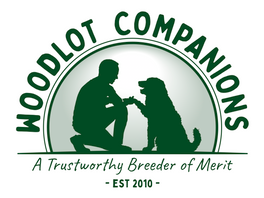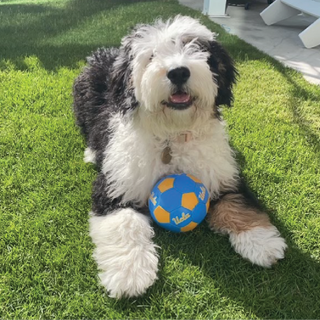How to avoid buying from a puppy mill
I had just moved to Ohio and was on assignment. It was a request from one of my L.A. based clients who inquired if I would be able to help him find 2 puppies in the beginning of the Covid-19 pandemic. He had deposits with other breeders in California but was shocked to see that the highly sought after mini bernedoodle breed he was looking for seemed to be available in Ohio from several breeders. So he hired me to set out on a quest to find the 2 best dogs that matched his lengthy criteria. However, given his status in the business world, it would be a stain on his reputation if it was found out that he ever bought from a puppy mill. We both had strong standards as to ensuring the puppies were being ethically treated. This very first trip sent me on a quest to find his dream dogs who not only had the look he was going for, but also the ideal temperament as well.
The Serendipitous Mini Bernedoodle Puppy Search
This is how I personally met Ray and Gladys Troyer at Woodlot Companions. They were humble, kind people who answered all of my questions and made me feel welcome on their property. I told them I was helping a client in California buy his perfect puppies and described to them about temperament testing the dogs but also giving an online buyer the peace of mind that they are getting exactly what they are paying for from quality people. They were intrigued by my process, and had never heard of someone going around being a ‘buyer’s agent’ for out of state puppy buyers. I never thought when I gave them my business card that it would lead to such a wonderful working relationship that we have today. The Troyer’s gave my number to many of their buyers who were afraid to buy a puppy online, or wanted to employ my puppy training skills and intuitive temperament testing abilities to make sure they got the puppy that best fit their lifestyle and family.
Because I temperament test independently for clients all over the country, I personally go check out puppies almost every week from the abundance of breeders in the area. Some great, some horrible- but boy do I have some stories to tell and I have certainly learned a lot!
What defines a puppy mill?
In my findings from walking on the property of many breeders and seeing first-hand how dogs are treated from family to family, I can assure you that a common misconception about a puppy mill is volume- as in the number of puppies they are producing every year. In my mind, volume is really not an issue if a breeder is treating the puppies and adult dogs ethically, has the proper kennel set up to humanely raise the dogs, and has also gone through the rigors of becoming certified by the USDA. The USDA certification alone would scare any unethical breeder away as this would allow a federal agent of the USDA to stop by their kennel at any point in time to inspect the property without notice, just like a health inspector or fire marshal can drop into a business to check on if the business is lawfully operating to code.
With the number of dogs taken into account as a non-essential variable that defines a puppy mill, we should have the tough talk regarding the ethical treatment of animals.
The Puppy Mill Business
There has been plenty of times that I roll up to a property to inspect the puppies and the puppies are in horrible shape. They smell like feces and urine even after they have been ‘bathed’ and/or they are timid and shy because they have only known life in the confines of a cage or small stall. Some puppies are already exhibiting signs or behaviors that they could be experiencing health issues. Mama dogs will look worn, exhausted, and unkept. Their kennel area will be dirty, or dogs will be in makeshift welping areas oftentimes too small and or in unclean lifestock stalls. Kennels will be in dilapidated buildings with no temperature control so cold winter days and hot summer months get tough on mamas and their babies. Oftentimes one doesn’t even need to see the kennel space as the property reflects the breeder’s lifestyle or lack of concern for keeping up basic maintenance on his property. If he has other animals that don’t look like they are happy or healthy chances are the puppies are living the same sad life.
Many breeders whom I would categorize as a puppy mill are in it for the money and nothing more. The less they invest in the breeding operations, the higher their potential profit margins. Nearly every breeder whom I have met that operates their puppy business with low standards is also breeding as a side hustle so there is no room for it to be their life’s passion or focus. Ethical stewardship is certainly not a defining phrase they care or exemplify.
I have personally walked onto properties where there was only 1-2 litters of puppies but I would still define them as a puppy mill because of how horrible of conditions their dogs were living in. Larger volume puppy mills will usually use a broker to help sell the puppies to the general public or wholesale the puppies to pet stores across the country.
Although puppy mills are becoming more and more rare these days, it’s still important to use caution before you buy. On top of the plethora of puppy scams out there, buying from a puppy mill will give you heartache from struggling with training to extra vet bills. It is important where you know your puppy is coming from. Most of the breeders I meet are amazing and really trying their best- so even though the Amish in particular have a stained reputation for puppy mills, I can assure you that you can’t peg one group of people for a problem that happens all over the country. I have seen it from all ethnicities and locations.
Buying A Puppy From an Ethical Breeder
Fortunately Woodlot Companions doesn’t fall into these categories. Do they have a lot of dogs? Yes, but the dogs live in a state-of-the-art facility, temperature controlled, heated floors, welping areas, private runs, doggie doors, and 7 acres to play when the Ohio weather allows. Woodlot routinely vet checks the adult dogs and puppies, have a grooming area for regular baths (I personally love the smell of their puppies!) import new breeding stock to keep bloodlines genetically diversified, and work on making sure puppies are socialized, temperament tested, and going to the right forever families. For the Troyer family, this is all they do 100% of the day as they are passionate about dogs just as much as they are passionate about being ethical stewards of each and every one of their animals. They strive to be the best breeders around and it shows in more ways than their show-quality kennel.
What types of breeders are in Ohio?
Hobby Breeders
Most breeders in Ohio are Hobby Breeders. This a big difference between the Woodlot Companions Kennel and other breeders in the area. According to the State of Ohio, Hobby breeders are only allowed to have a maximum of 5 female dogs on their property. Any more than 5 and they need to be certified by the state to operate as a professional breeder which also comes with more rules and regulations to follow. There is nothing wrong with a hobby breeder. I have personally met many of them who have excellent kennels who care about temperature control, cleanliness, timely vaccinations, and are overall great caretakers of their dogs. They operate their puppy kennel as a miniature size of a professional kennel. As with any hobby in life, participants can be as minimally or as passionately involved as they see fit or as life allows. With a hobby breeder, most don’t have individual websites so you will find a lot of their listings on places like www.lancasterpuppies.com and www.greenfieldpuppies.com.
Family Pet Breeders
Family pet breeders only breed their family pets- 1-2 dogs once a year. Their main focus for breeding is less about a side hustle to supplement their income, and more about teaching their young kids the responsibility of caring for animals. Since many of the Ohio breeders live out in the country with farms, having their young kids learn to care for a litter of puppies is their first primer into caring for the rest of the farm animals. Not only do the children learn about birthing and the different responsibilities throughout the different stages of growth, but they also learn the tough emotional lesson of letting go of their puppies when it’s time to find their forever homes. Family breeders only have 1-2 litters a year so buying from a family breeder is much more rare.
Professional Breeding Kennels
Woodlot Companions is a professional breeding kennel. At a minimum they are subject to state breeding kennel regulations. The state of Ohio has passed a lot of legislation in the past few years to really clean up the puppy mills from staining the states reputation. Some professional kennels will also opt to be certified by the U.S. Department of Agriculture which has even higher standards placed on breeding operations. When you buy from a professional kennel, you can rest assured that your puppy and their parents are being treated in the most ethical and legal way possible, but those standards and the professional pride in a kennel usually doesn’t stop there.
Is it possible to both be humble yet take significant personal pride in what you are doing? When I think of Ray and Gladys Troyer along with their son Merlin who are the backbone of the operations of Woodlot Companions, the answer is a resounding YES! They meticulously care about the details in ways I can’t even begin to describe in this blog- from bathing, deworming, brain development, research, and customer interactions they are meticulous and detailed in so many of the things you just don’t see them doing behind the scenes to not only create quality puppies, but quality experiences for the buyer. I have yet to walk into a kennel who is doing what they do in this area which is why I love to be invited to come regularly for temperament testing! Woodlot Companions is not only setting the standard for the buyer, but is also being the standard to which other breeders can be inspired to operate their kennels from.



